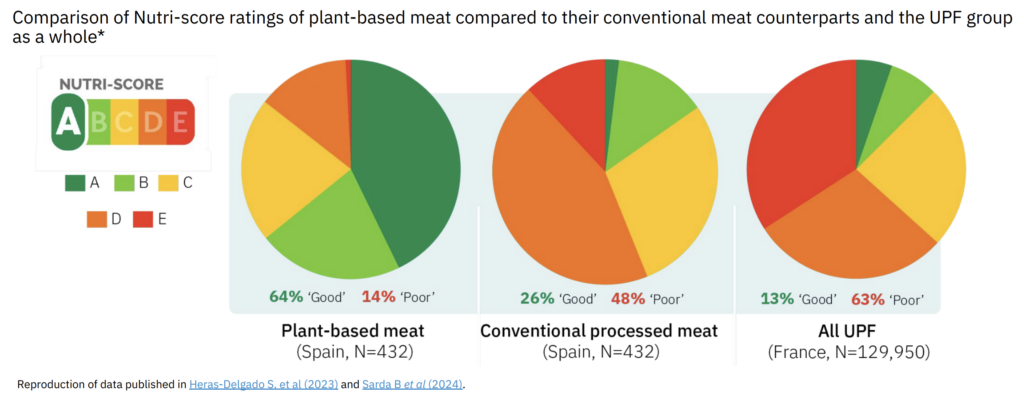
A new study from France suggests that nutritious plant-based diets high in UPFs don’t lower the risk of heart disease more than minimally processed, meat-rich diets. But experts warn it is highly misleading.
Does highly processed equal bad for you?
It’s a question that has had health experts sparring with each other ever since the idea of ultra-processed foods (UPF) hit the mainstream.
According to the Nova classification, devised in 2009, UPFs are made via industrial formulations and techniques like extrusion or pre-frying, featuring cosmetic additives and substances deemed to be of little culinary use. Basically, if you can’t make it in your kitchen, there’s a good chance it’s a UPF.
That definition, however, has been criticised as too broad and arbitrary and it has spawned an entire movement against processed foods – there’s now a Non-UPF Verified label for companies to put on their products, and California has banned these products from school cafeterias. Even the Trump administration is being called upon to regulate UPFs as part of its Make America Healthy Again (MAHA) movement.
All this has stemmed from research linking UPFs with a variety of health conditions, heart disease among them. Plant-based products like meat and cheese alternatives have been caught in the crossfire too, with consumers voting with their wallets and sales dropping by 7% and 4% in the US in 2024, respectively.
Many of these studies are highly misleading and serve as a launchpad for attention-grabbing headlines that completely miss the point. For example, in a widely covered study last year, plant-based meat products accounted for only 0.2% of all UPF calories eaten; media coverage sought to blame “fake meats” instead of the real culprits.
That seems to have happened again with newly published research from France, which argues that even nutritious plant-based diets don’t pose any cardiovascular benefits if they’re high in UPFs, compared to meat-heavy diets with low intake of ultra-processed products. However, read between the lines, and the truth is somewhat skewed.
What does the study say about plant-based UPFs?

The study, published in The Lancet Regional Health, was conducted by researchers at public research bodies INRAE and Inserm, and education institutes CNAM and Université Sorbonne Paris Nord. They analysed health data from nearly 64,000 adults participating in the French NutriNet-Santé cohort, and followed up with them after 9.1 years on average.
Their findings suggest that people whose diets were rich in nutritious plant-based foods – those low in sugar, salt and fat – with little to no industrial processing had a 40% lower risk of developing cardiovascular disease than those who eat high amounts of animal products and fewer plant-based ones.
That is consistent with a range of other studies, which have found that plant-rich diets – thanks to their lower saturated fat and cholesterol content – are much more beneficial for heart health than meat-based diets.
Even among people who predominantly ate plant-based foods, the French researchers found that diets that were lower in nutritional quality and ultra-processed were linked with a 40% greater risk of cardiovascular disease than diets rich in nutritious products with minimal processing.
However, diets rich in both plants and UPFs did not lower cardiovascular risk more than diets heavy on meat and low on UPFs. That, the authors argued, highlights the need to consider both the nutritional quality and degree of processing in health discourse, and can support policies that promote nutritious, non-UPF plant-based foods.
“Future research could usefully explore the impact on health of different categories of ultra-processed foods, particularly plant-based substitutes,” they wrote.
The problem is, the researchers take a singular brush to plant-based foods, bundling ready-to-eat pastas, store-bought soups, and confectionery items with meat alternatives. Without reading the fine print, it leaves the impression that all plant-based UPFs are bad, which – as multiple other studies have revealed – is decidedly not the case.
Why the research is misleading about plant-based meat

There are several shortcomings and misleading elements in the study, according to Amy Williams, nutrition lead at the Good Food Institute (GFI) Europe. For instance, definitions of what comprises a ‘plant-based UPF’ were not standard, since this category included cakes and pastries containing animal products.
Moreover, the matrices ‘UPF healthy plant-based diet’ and ‘UPF unhealthy plant-based diet’ were confusingly named, as a majority of the participants in the study were meat-eaters – these matrices only tell us how much healthy or unhealthy plant foods people were eating relative to the rest of the group. Plant-based meat, incidentally, veered towards the healthy side, as it was generally made of legumes.
Speaking of which, meat alternatives were more commonly eaten in diets scoring highly on the ‘unprocessed healthy plant-based diet’ metric than any other diet, so the limited associations the paper does find likely do not bear much relevance.
“This study has nothing to tell us about the nutritional benefits of plant-based meat, which made up 0.1% of the food eaten by participants. It is based on food diaries taken an average of nine years ago – long before many of today’s plant-based meat products entered the market,” Williams tells Green Queen.
“Instead, as we see in other UPF studies, processed conventional meat was eaten far more widely, and featured most heavily in the ‘unhealthy UPF diet’ compared to any of the others. This food, which plant-based meat generally replaces, is consistently associated with adverse health outcomes.
“Anyone looking for a more robust source of evidence about plant-based meat should examine the randomised controlled trials, which have found that replacing conventional meat with this food can reduce LDL (bad) cholesterol, and support weight management,” notes Williams.
Research by GFI Europe and the Physicians Association for Nutrition has contended that most studies overlook important nuances of plant-based meat, which has a very different nutritional profile from most UPFs, potentially misleading consumers about their health impact.
And in a recent scientific advisory, the American Heart Association punctuated this point, stating that not all UPFs are unhealthy, and policymakers should nudge people towards healthier UPFs, which include whole plant foods, whole-grain breads, and meat and dairy alternatives low in sugar, salt, and fat.
The post Study Claims Plant-Based Diets Aren’t Nutritious If They’re Ultra-Processed – Experts Disagree appeared first on Green Queen.
This post was originally published on Green Queen.